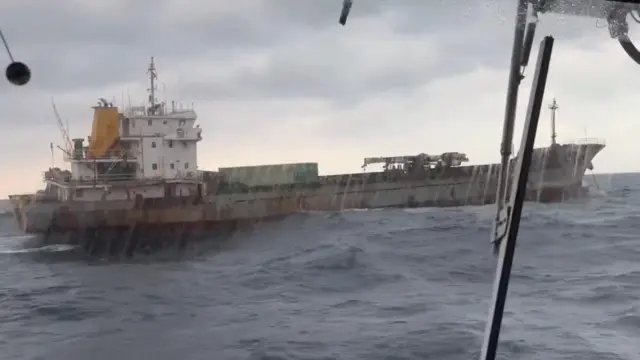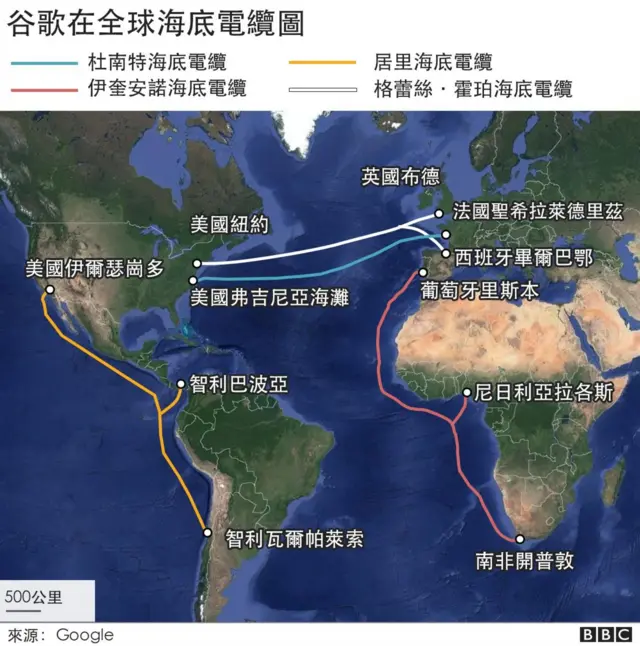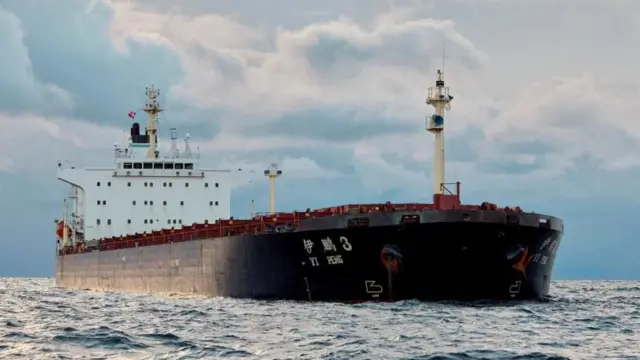Was it an accident or a "gray zone" operation by Beijing? Why did the destruction of Taiwan's submarine cables spark a heated debate?

According to British media reports, submarine communication cables outside Keelung Port in northern Taiwan were damaged last week. Preliminary investigations showed that it was caused by a Hong Kong-based cargo ship, Shunxig 39, "dragging anchor".
The Financial Times published an investigative report last weekend saying that the Taiwan Executive Yuan Ocean Affairs Council has confirmed that on the morning of January 3, the Cameroonian cargo ship Shun Hing 39 caused damage to the international submarine cables connecting Taiwan in the waters northeast of Yehliu, Keelung, Taiwan.
The report said that although the ship flew the Cameroon flag, Taiwanese officials said it actually belonged to Jie Yang Trading Limited, which was registered in Hong Kong and whose sole registered director was Chinese citizen Guo Wenjie.
This incident has sparked public discussion in Taiwan, with many even believing that it may be a sign of Beijing's escalating "gray zone" operations: "War does not just start when missiles fall!" "Is a war really going to start?" Some netizens have had heated discussions on social media.
Democratic Progressive Party legislators Shen Bo-yang and Chen Guan-ting spoke at the Legislative Yuan in Taiwan today (January 6) and said that this incident seriously affects Taiwan's defense security.
According to Taiwan media CNR News, the two legislators suggested that the Taiwan Executive Yuan's Maritime Affairs Council should strengthen its first-time response plan for similar incidents in the future, including demarcating important cable areas, intercepting and inspecting, and coordinating the repatriation of detained ships.
Chen Yu-chen, a Kuomintang legislator from Kinmen, said that before the results of the investigation are released, people should not randomly accuse the operation of being a gray area and cause panic among the public.
The Taiwan Coast Guard Administration issued a press release on January 4, confirming that at 7:45 a.m. on January 3, four cores of an international submarine cable were damaged in the waters northeast of Yehliu. The Coast Guard Administration's Tamsui Coast Guard Team received a report from Chunghwa Telecom. Chunghwa Telecom stated that preliminary assessment was that the damage was caused by the Cameroonian cargo ship "SHUNXIN39" that was passing through the area.
The Coast Guard Administration dispatched a patrol boat to the scene that afternoon and found the cargo ship in the northern waters of Yehliu and asked it to return to the waters off Keelung Port for investigation. The agency said that it would transfer the Chunghwa Telecom report, radar, and navigation evidence to the District Prosecutor's Office for investigation and prosecution, and investigate the criminal responsibility and compensation of the relevant personnel.
Some experts warned that although the details of the individual case are still to be investigated and clarified, China's practice of destroying infrastructure through maritime conflicts is not uncommon, and this incident has highlighted that China is once again developing and upgrading its "gray zone warfare."
According to an investigation by the Financial Times, the ship had been sailing continuously in the waters near the northern coast of Taiwan since December 8 last year. An unnamed national security official in Taiwan told the newspaper that such sailing behavior was highly suggestive and the cable damage was not a simple accident.
This article contains content provided by Google YouTube. As these contents use technologies such as cookies, we will ask for your consent before loading any content. You may wish to read the Google YouTube Cookie Policy and Privacy Policy before giving your consent . If you wish to read the above, please click "Accept and Continue".
End of YouTube post
The suspected ship has sailed to Busan, South Korea
According to Taiwan's Central News Agency, Chunghwa Telecom, which is responsible for Taiwan's cable communications equipment, immediately activated the emergency backup mechanism after the accident, transferred communications services to other international submarine cable stations, and restored all customer services in a short period of time. However, Taipei is concerned about the possibility that China may secretly cut off external communications in its attempt to annex Taiwan.
The damaged cable is part of the Trans Pacific Express Cable System, an undersea Internet cable connecting Taiwan to the west coast of the United States that is jointly owned by telecom operators from multiple countries, including Chunghwa Telecom, AT&T of the United States, NTT of Japan, Korea Telecom, China Telecom and China Unicom.
A Taiwan Coast Guard official told the media that Taiwan has asked South Korean authorities to investigate the Shun Hsing cargo ship at its next port of call because it could not question its captain. The ship is expected to arrive in Busan, South Korea, in the coming days, according to Taiwan's national security officials. The Coast Guard said tracking data showed the ship had dragged anchor near the site of the cable break.
Although the Coast Guard's boats conducted an external inspection of the freighter and established radio contact with the captain, due to bad weather, the Coast Guard personnel were unable to board the ship and could not detain the ship for further investigation in accordance with international law.

A senior Taiwanese national security official told the Financial Times that the trend of sabotaging submarine cables around the world is worrying and this is another cautionary tale. He stressed that the ships involved in such incidents are usually old and rarely engaged in commercial activities. The condition of the cargo ship involved in this case is also very bad, similar to those that make up Russia's "shadow fleet".
Strategic scholar and current Democratic Progressive Party legislator Shen Po-yang said in an interview with Taiwanese media today that Taiwan's submarine cables have been damaged more and more frequently, which must be related to China's escalation of gray zone warfare. However, the submarine cables are currently managed by Chunghwa Telecom. Once damaged, the Coast Guard Administration will only pursue them after receiving a report. Therefore, Legislator Shen suggested that the responsible units in Taiwan should revise the relevant operating regulations. If the situation escalates, law enforcement-related actions must be taken immediately, and consideration should be given to purchasing new satellites and other equipment to analyze and collect "suspicious ship trajectories."
Submarine cables: A new hotspot in gray zone warfare?

Submarine cables play a vital role in global communications and international security. As the backbone of the global Internet, these cables carry the majority of international data traffic, and their stability and security directly affect countries' communication capabilities and economic activities. With the development of the digital economy, submarine cables have become an international strategic resource, and many experts say the ability to control or influence these cables can enhance a country's geopolitical power, especially since submarine cables are crucial for military communications.
Since modern military operations often rely on secure and stable communications, protecting these infrastructures is a priority for national defense. As a result, submarine cables have become potential targets of attack, and interference or even deliberate destruction of cables could pose a threat to regional security.
In November 2024, two submarine fiber-optic communication cables were cut in the Baltic Sea in Eastern Europe, when European investigators targeted the Chinese bulk carrier Yipeng 3, sparking a diplomatic dispute. According to the Financial Times, Beijing originally allowed European investigators to board the Yipeng 3 for investigation, but the Swedish government recently said that the Chinese government refused to allow one of the Swedish prosecutors to board the ship, so there was no opportunity to question the crew before the ship left.
Taiwan's current telecommunications network relies heavily on submarine cables. In order to respond to any potential risks of military conflict, Taiwan is considering stepping up the development of low-orbit satellites (LEO satellites) as a communication method to replace submarine cables and enhance military defense resilience.
Comments
Post a Comment